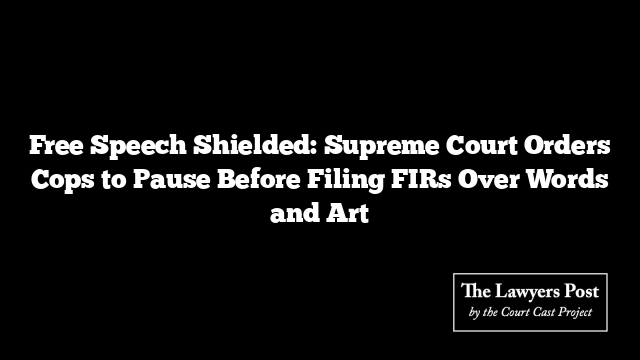In a ruling that sharpens the line between dissent and crime, the Supreme Court has stepped in to stop the growing trend of knee-jerk criminal cases against speech, poetry, and opinion. From now on, if someone is accused of an offence punishable by three to seven years in prison—and if that accusation involves speech or expression—police must first conduct a preliminary inquiry before even thinking about filing an FIR.
This move is rooted in the newly minted Bharatiya Nagarik Suraksha Sanhita (BNSS), specifically Section 173(3), which gives police 14 days to determine whether there’s a prima facie case—but only after getting the green light from a Deputy Superintendent of Police or above.
The top court stressed this isn’t just bureaucratic red tape. It’s a buffer zone meant to protect the very heart of democratic freedom: the right to speak, write, sing, post, or create without fear of criminal prosecution—unless there’s real reason to believe it crossed a legal line.
The judgment came in response to a case involving Congress MP Imran Pratapgarhi, whose Instagram post layered a poem—”Ae khoon ke pyase baat suno”—over a video. Gujarat Police had filed an FIR against him. The Supreme Court tossed that FIR out, making it clear: artistic or political expression doesn’t automatically make someone a criminal.
Justices Abhay S. Oka and Ujjal Bhuyan underscored the stakes: when the law is used to silence speech, even temporarily, it erodes the very freedoms guaranteed under Article 19(1)(a) of the Constitution.
They pointed out that certain laws, like Section 196 of the Bharatiya Nyaya Sanhita (which addresses speech that might promote enmity), require officers to go beyond surface-level reactions. Before acting, the police must read or hear the words and ask themselves a fundamental question: Do these words, taken at face value, really constitute a crime?
And here’s the twist: this doesn’t conflict with the older CrPC’s Section 154, under which FIRs were to be registered immediately if a cognizable offence was suspected. The BNSS introduces a clear exception via Section 173(3), which allows a short but crucial pause—meant not to delay justice, but to prevent its misuse.
The Court recalled the precedent set in Lalita Kumari v. Government of U.P., where a preliminary inquiry was only allowed in ambiguous situations. Under the BNSS, that space has widened. The police now have formal authority to pause and consider—not just react.
In Imran Pratapgarhi’s case, the Court went a step further: even without invoking the new Section 173(3), there was no criminal case to be made. His words didn’t incite violence, didn’t sow hatred, didn’t call for rebellion. They were words—protected, powerful, but not punishable.
With this ruling, the Supreme Court has effectively drawn a line in the sand: speech must not be strangled by law unless there’s real evidence of legal breach. And before criminal machinery kicks in, especially when art or opinion is involved, a pause for thought is no longer optional—it’s mandatory.





